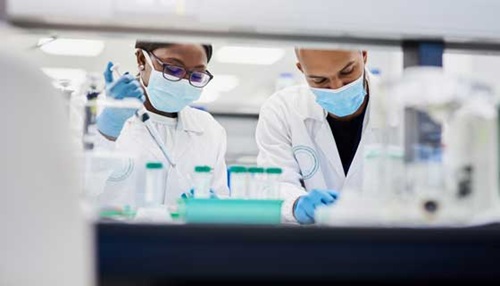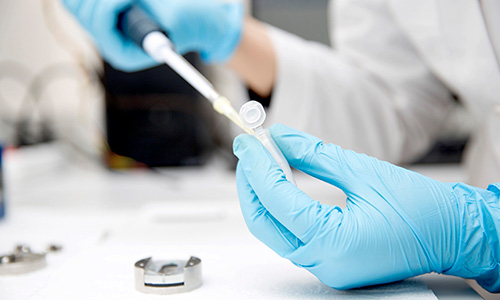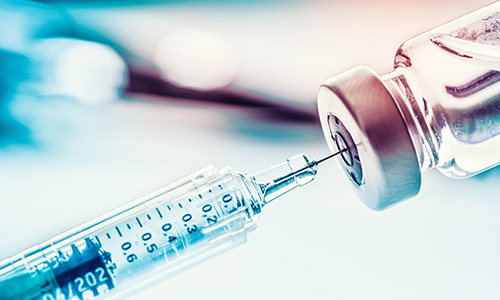And I Said No. You Know
COVID Variants: What You Should Know
Featured Experts:
Updated on January 14, 2022
In Dec 2020, news media reported a new variant of the coronavirus that causes COVID-nineteen, and since then, other variants have been identified and are nether investigation. The new variants enhance questions: Are people more at take a chance for getting sick? Will the COVID-19 vaccines nevertheless piece of work? Are at that place new or unlike things you should practice at present to stay safe?
Stuart Ray, K.D., vice chair of medicine for data integrity and analytics, and Robert Bollinger, M.D., M.P.H., Raj and Kamla Gupta professor of infectious diseases, are experts in SARS-CoV-two, the virus that causes COVID-xix. They talk about what is known almost these new variants, and answer questions and concerns y'all may accept.

COVID Omicron Variant: What You Need to Know
What is the omicron variant? Our experts share what we know near this new coronavirus variant.
Coronavirus Mutation: Why does the coronavirus change?
Variants of viruses occur when at that place is a change — or mutation — to the virus's genes. Ray says it is the nature of RNA viruses such every bit the coronavirus to evolve and change gradually. "Geographic separation tends to result in genetically distinct variants," he says.
Mutations in viruses — including the coronavirus causing the COVID-xix pandemic — are neither new nor unexpected. Bollinger explains: "All RNA viruses mutate over fourth dimension, some more than than others. For case, flu viruses modify often, which is why doctors recommend that you become a new flu vaccine every year."
What is the delta variant?
Since the beginning of the COVID-19 pandemic, the SARS-CoV-2 coronavirus that causes COVID-nineteen has mutated (changed), resulting in different variants of the virus. I of these is chosen the delta variant (arising from Pango lineage B.1.617.ii). The delta coronavirus is considered a "variant of business" by the WHO and CDC because information technology appears to be more easily transmitted from one person to another. Every bit of September 2021, delta is regarded equally the most contagious class of the SARS-CoV-2 coronavirus then far.
Here is what you should know:
The CDC recommends that everyone wait until they are fully vaccinated for COVID-19 before traveling internationally. Traveling internationally if you are not fully vaccinated for COVID-xix is not recommended, because it puts you lot at adventure for coronavirus infection, including the SARS-CoV-two delta variant. This includes unvaccinated children.
- Delta rapidly became the ascendant variant of the SARS-CoV-2 virus in the U.S. in 2021.
- Delta variant SARS-CoV-ii, the virus that causes COVID-xix, is at present in most countries where SARS-CoV-2 is circulating, and people traveling internationally are probable to encounter it.
- Unvaccinated adults and children should strictly follow mask, distancing and hygiene rubber precautions and avoid international travel if possible.
- Beingness fully vaccinated for COVID-19 can protect you from the delta variant, but breakthrough infections sometimes occur.
- All 3 of the F.D.A.-authorized COVID-nineteen vaccines can protect you from the delta variant. For Pfizer and Moderna vaccines, you demand both doses for maximum protection. People should know that vaccines are very effective at preventing the about severe forms of COVID-19, but breakthrough infections tin occur and caution is even so warranted after becoming vaccinated.
- While the authorized COVID-19 vaccines are not perfect, they are highly effective against serious coronavirus disease and reduce the gamble of hospitalization and death.
- Other vaccines available in other countries may not be as constructive in protecting you lot from the delta variant and other mutations of the coronavirus.
- Although vaccines beget very high protection, infection with the delta and other variants remain possible. Fortunately, vaccination, even among those who acquire infections, appears to foreclose serious disease, hospitalization and death from COVID-nineteen.
How many strains of COVID are there?
"We are seeing multiple variants of the SARS-CoV-2 coronavirus that are dissimilar from the version first detected in China," Ray says.
"Different variants take emerged in England, Brazil, California and other areas. More infectious variants such as beta, delta and omicron may have increased power to re-infect people who accept recovered from earlier versions of the coronavirus, and likewise be somewhat resistant to some of the coronavirus vaccines. Still, vaccines currently used appear to offer significant protection from severe disease caused by coronavirus variants."
What is a variant of business concern?
Coronavirus variants are classified in different categories by organizations such every bit the Earth Health Organization (WHO) and the Centers for Disease Control and Prevention (CDC).
A variant of interest is a coronavirus variant that, compared to earlier forms of the virus, has genetic characteristics that predict greater transmissibility, evasion of immunity or diagnostic testing or more astringent affliction.
A variant of concern has been observed to be more infectious, more likely to cause breakthrough or re-infections in those who are vaccinated or previously infected. These variants are more probable to cause severe disease, evade diagnostic tests, or resist antiviral treatment. Alpha, beta, gamma, and delta variants of the SARS-CoV-2 coronavirus are classified as variants of concern.
A variant of high consequence is a variant for which current vaccines do non offering protection. As of now, in that location are no SARS-CoV-2 variants of high outcome.
Will the COVID-xix vaccines work on the new variants?
Ray says, "There is evidence from laboratory studies that some allowed responses driven by current vaccines could exist less effective against some of these variants. Those eligible for COVID-19 booster should obtain them for added protection against infection and severe disease.
"The immune response involves many components, including B cells that make antibodies and T cells that can react to infected cells, and a reduction in one does not mean that the vaccines will not offering protection.
"People who have received the vaccines should sentinel for changes in guidance from the CDC [Centers for Affliction Control and Prevention], and go along with coronavirus rubber precautions to reduce the run a risk of infection, such every bit mask wearing, concrete distancing and hand hygiene."
"We deal with mutations every year for flu virus, and will keep an eye on this coronavirus and runway it," says Bollinger. "If at that place would ever be a major mutation, the vaccine evolution process tin adapt changes, if necessary," he explains.
How are the new coronavirus variants unlike?
"There's testify that some genetic changes in SARS-CoV-2 can result in a more contagious variant," Bollinger says. "This is particularly truthful for the delta and omicron variants."
He notes that some of the mutations seem to bear upon the coronavirus'due south spike protein, which covers the outer coating of SARS-CoV-2 and requite the virus its characteristic spiny appearance. These proteins help the virus attach to human cells in the nose, lungs and other areas of the body.
"Researchers have preliminary show that some of the new variants seem to demark more tightly to our cells" Bollinger says. "This appears to make some of these new strains 'stickier' due to changes in the spike poly peptide and therefore more easily transmitted."
Are coronavirus variants more unsafe?
Bollinger says that some of these mutations may enable the coronavirus to spread faster from person to person, and more than infections can overwhelm healthcare facilities and result in more than people getting very sick or dying. In add-on, studies are underway to determine whether some variants could be associated with more astringent disease.
"Therefore, information technology is very important for us to expand the number of genetic sequencing studies to keep track of these variants," he says.
Bollinger explains that it may be more than advantageous for a respiratory virus to evolve so that it spreads more easily. On the other manus, mutations that brand a virus more mortiferous may not requite the virus an opportunity to spread efficiently. "If we get too ill or die quickly from a detail virus, the virus has less opportunity to infect others. Nevertheless, as nosotros take seen with delta and omicron, more infections from a faster-spreading variant will lead to more hospitalizations and deaths," he notes.

Coronavirus (COVID-nineteen) Email Alerts
Sign upward to receive coronavirus (COVID-nineteen) e-mail updates from Johns Hopkins Medicine.
Could a new COVID-19 variant bear upon children more often than earlier strains?
Ray says that widespread infection with the delta and omicron variants has resulted in an increased number of cases in children, including uncommon astringent infections and deaths.
"At that place is no disarming evidence that any of the variants have special propensity to infect or crusade affliction in children. Nosotros need to exist vigilant in monitoring such shifts, only nosotros tin can merely speculate at this point," he says.
Will there be more new coronavirus variants?
Yes. As long every bit the coronavirus spreads through the population, mutations will continue to happen, and the delta and omicron variant families continue to evolve.
"New variants of the SARS-CoV-2 virus are detected every week," Ray says. "Most come and go — some persist but don't get more common; some increase in the population for a while, and so fizzle out. When a modify in the infection design start pops up, it tin be very hard to tell what'south driving the tendency — changes to the virus, or changes in human behavior. Information technology is worrisome that like changes to the fasten poly peptide are arising independently on multiple continents."
Are at that place additional COVID-19 precautions for the new coronavirus variants?
Bollinger says that equally of now, none of the new coronavirus variants call for any new prevention strategies. "We need to proceed doing the bones precautions that nosotros know work to interrupt spread of the virus," he says.
Ray concurs: "In that location is no sit-in yet that these variants are biologically unlike in ways that would require whatever change in current recommendations meant to limit spread of COVID-nineteen," he says. "However, we must go on to be vigilant for such phenomena. For now, the greater infectiousness we're seeing means we must redouble our efforts using the preventative tools that we take in a multi-layered approach."
Ray stresses that both vaccination and human behavior are important. "It is striking to note that the majority of COVID-nineteen deaths are now occurring in unvaccinated people, even when most adults in the USA have been vaccinated," he says.
"The more people who are unvaccinated and infected, the more than chances there are for mutations to occur. Limiting the spread of the virus through maintaining COVID-19 safeguards (mask wearing, concrete distancing, practicing manus hygiene and getting vaccinated) gives the virus fewer chances to change. It also reduces the spread of more infectious variants, if they do occur.
"Vaccines are the medical phenomenon of 2020, merely nosotros need to re-emphasize basic public health measures, including masking, physical distancing, good ventilation indoors and limiting gatherings of people in close proximity with poor ventilation. Nosotros requite the virus an advantage to evolve when we congregate in more confined spaces," he says.
Regarding coronavirus variants, how concerned should we be?
"Almost of the genetic changes we come across in this virus are similar the scars people accumulate over a lifetime — incidental marks of the road, nearly of which accept no groovy significance or functional role," Ray says. "When the testify is strong enough that a viral genetic alter is causing a change in the behavior of the virus, we proceeds new insight regarding how this virus works. The virus seems to have some limitations in its evolution – the advantageous mutations are drawn from a relatively limited menu – so at that place is some hope that nosotros might not see variants that fully escape our vaccines.
"Updated versions of the current vaccines are existence evaluated, but there is no clinical trial evidence nonetheless that variant-specific vaccines would provide significantly greater protection. Though SARS-CoV-2 is changing gradually, it'due south still much less genetically various than influenza."
"Equally far as these variants are concerned, nosotros don't need to overreact," Bollinger says. "But, equally with whatever virus, changes are something to be watched, to ensure that testing, treatment and vaccines are however effective. The scientists will continue to examine new versions of this coronavirus's genetic sequencing as it evolves."
"In the concurrently, we demand to proceed all of our efforts to prevent viral manual and to vaccinate as many people as possible, and every bit soon as we can."

COVID-19 Vaccine
Go data and updates from Johns Hopkins Medicine.
Source: https://www.hopkinsmedicine.org/health/conditions-and-diseases/coronavirus/a-new-strain-of-coronavirus-what-you-should-know


0 Response to "And I Said No. You Know"
Post a Comment